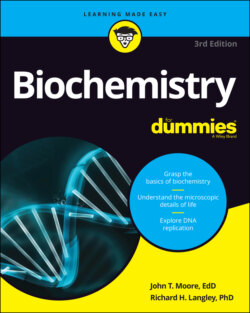Читать книгу Biochemistry For Dummies - John Moore T., Richard Langley H., John T. Moore - Страница 49
Alcohols
ОглавлениеAlcohols are subject to oxidation (loss of electrons, gain of oxygen, or loss of hydrogen). Mild oxidation of a primary alcohol (where the is attached to the carbon atom at the end of a chain (called a terminal carbon) produces an aldehyde, which may undergo further oxidation to a carboxylic acid. Under similar conditions, a secondary alcohol ( is attached to a carbon bonded to two other carbons) yields a ketone, and a tertiary alcohol ( is attached to a carbon bonded to three other carbons) doesn’t react. This behavior is important in the chemistry of many carbohydrates.
Under extreme oxidizing conditions, alcohols and all other organic compounds will undergo combustion. Under controlled conditions this combustion is really useful (campfires, barbeque grills, and so on), but uncontrolled combustion can lead to a fiery mess.
The presence of the leads people mistakenly to assume that alcohols are bases. Nothing could be further from the truth! Alcohols, under biological conditions, are neutral compounds. Phenols, in which the is attached to an aromatic ring, though, are weak acids.
